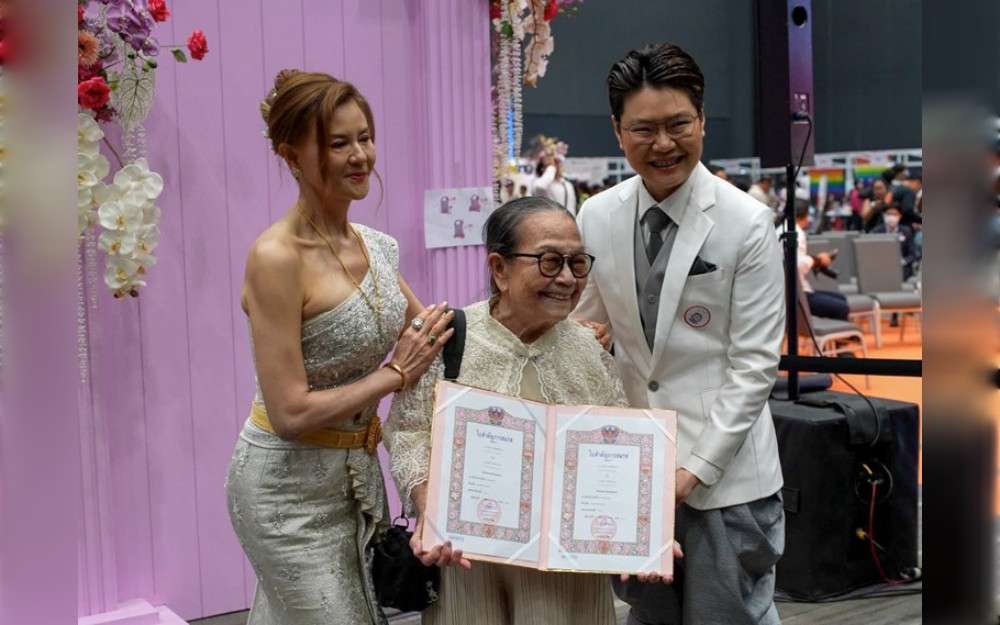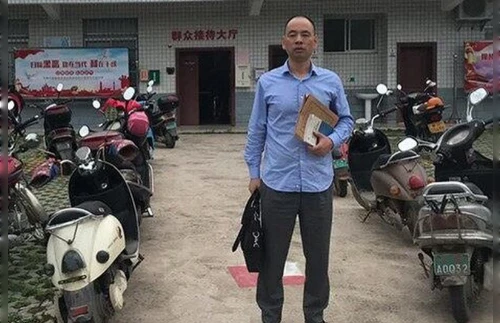The law grants equal rights including property management, state benefits and medical consent authority.
Krueg Prachakul and Nontarat Phaicharoen/Bangkok

As Thailand’s historic same-sex marriage law took hold, Rungtiwa Thangkanopast recalled the email connection with her partner that blossomed into so much more.
Rungtiwa, 59, and her partner Phanlavee Chongtangsattam, 44, were among dozens of LGBTQ+ couples and their loved ones who gathered at a shopping mall in Bangkok to legally register their same-sex unions on Thursday, the first day of the new law taking effect.
“We fell in love before we even met. When we finally did meet, despite our 15-year age gap, we’ve never been apart since,” Rungtiwa said, describing her relationship with Phanlavee as they waited to register their marriage.
Jan. 23 marked a watershed moment for Thailand, when it became the first Southeast Asian nation to record same-sex marriages and only the third place in Asia after Taiwan and Nepal to do so.
Prime Minister Paetongtarn Shinawatra celebrated the law’s implementation, stating, “Through the power of love, Thailand has made history today, showing the world we embrace all forms of love and accept gender diversity – fundamental principles of democracy.”
The law grants same-sex couples equal marriage rights, including property management, state benefits, medical consent authority and joint adoption rights.

To commemorate this historic occasion, Bangkok Pride joined forces with the Bangkok Metropolitan Administration and equality advocacy partners to host a “Marriage Equality” celebration at Paragon Hall in the Siam Paragon shopping mall.
Law’s history
The journey to this milestone began decades ago. In 2001, Thailand’s Interior Ministry considered allowing same-sex marriage registration, but public opposition derailed the effort.
A civil partnership bill emerged in 2012 but stalled after a military coup in 2014 that brought in the government led by Prayuth Chan-o-cha, who served as prime minister after leading the takeover.
The breakthrough came in March 2024, when Parliament approved the equal marriage law with overwhelming support – 400 votes in favor, two abstentions and three no-shows. The Senate followed in June with 130 supporting votes, leading to the law’s enactment in September.
For Rungtiwa and Phanlavee along with the other couples, the law addresses crucial practical concerns beyond symbolic recognition.
“We first felt the need for legal rights when Rungtiwa’s mother needed emergency surgery,” Phanlavee told BenarNews. “Despite being her caregiver, I couldn’t sign the medical consent forms because I had no legal status as her daughter’s partner. It was a life-or-death moment.”
More work needed
Despite the breakthrough, Naiyana Supapung, a former member of the National Human Rights Commission, said more work needed to be done.
“The equal marriage law marks 80% progress, but the remaining 20% involves gender-neutral language,” Naiyana told BenarNews. “The government must quickly amend 40 to 50 related laws to remove gender-specific terms like ‘man,’ ‘woman,’ ‘husband’ and ‘wife’ to ensure truly equal legal treatment.”
The Associated Press news service reported that as of 6 p.m. local time on Thursday, 1,832 couples, including 654 in Bangkok, had registered for marriage licenses, according to the Department of Provincial Administration.
Activists said they hoped at least 1,448 same-sex marriages would take place nationwide on Thursday in response to the Civil and Commercial Code Article 1448 that they had lobbied to get amended to replace the words “man and woman” and “husband and wife” with “individuals” and “marriage partners,” the news service reported.
US rollback
The law’s implementation contrasts with recent developments in the United States, where Donald Trump’s return to the presidency on Jan. 20 came with declarations of recognizing only male and female genders and rolling back LGBTQ+ rights.
For Rungtiwa and Phanlavee, who have shared their lives for 20 years while raising their daughter Ozone, 24, the law validates their family’s reality.
“Our life together – cooking meals, helping with homework, tucking our daughter in, braiding her hair before school, laughing together – that’s happiness. That’s enough for us,” Panwalee said.
The change affects thousands of Thai couples who can now legally marry. Registration offices across the country reported high turnout on the first day.
Before the law passed, some couples staged symbolic protests, including Rungtiwa and Phanlavee, who once donned wedding dresses to request marriage registration, knowing they would be refused.
“We’ve finally achieved our dream because we can move forward legally now,” Rungtiwa said at the ceremony. “This law shows Thailand is modern and has embraced new perspectives. It brings happiness to everyone who loves equally, regardless of their gender, as long as it’s the person we love.”
Copyright ©2015-2024, BenarNews. Used with the permission of BenarNews.












